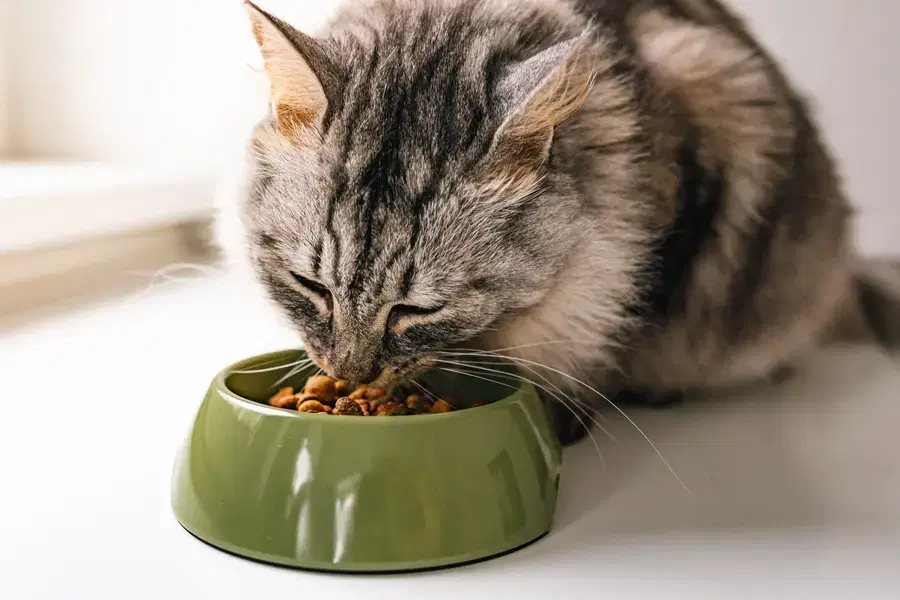What Herbs Can Cats Eat?
Many plants have active therapeutic characteristics that can be healthy for cats, some even proven to aid with issues ranging from stress reduction and digestion to immune system function and inflammation. Herbs in particular can be healthy for cats, but some varieties are toxic to them.1
If your cat is an outdoor cat, he or she may be at higher risk of eating harmful plants from your garden or the neighborhood. The simplest method to help keep your cat happy and healthy is to learn which herbs are poisonous to cats. Do your research before introducing any herbs to your cat's diet. If your cat does consume a harmful plant, contact your veterinarian right away.
Once you have found an herb that is safe for your cat to consume, you can give it to them fresh, dried, or in liquid, capsule, or pill form. Seeking out natural items to incorporate into your cat's diet may result in improved health, contentment, and a positive mood boost! Here are eleven herbs and spices that are considered excellent complements to your cat's nutritious diet.
How Can Valerian Help?
Valerian, a lesser-known alternative to catnip and silver vine, is a stimulant for cats. This spicy herb has been known to help overweight cats move around more,1 essentially becoming the feline versions of Richard Simmons. Valerian is an excellent choice for your indoor kitty garden.
Can Witch Hazel Help?
Veterinarians occasionally recommend using witch hazel to treat feline acne. Once or twice a day, wet cotton balls with witch hazel and clean your cat's chin. Caution should be excersized if using witch hazel as some of its compounds, if ingested, are toxic to cats.2
Is Licorice Root helpful?
Licorice root acts as a natural cortisone and can be used to help soothe itchy kitties with allergies, endocrine and digestive issues, as well as respiratory problems like colds since it helps soothe mucus membranes.1
Can Dandelion Roots Help?
Dandelion root is glycerin-based and is safe for cats. It can aid with digestion, helps maintain level blood sugar, supports liver health, and can boost the immune system.3
Can Calendula Help Cats?
Calendula flowers have a high concentration of saponins, which are bitter-tasting substances thought to have anti-inflammatory properties. Its antibacterial characteristics can be used to help accelerate wound healing.1 However, before putting anything in your cat's eyes or ears, please consult your veterinarian!
Can Marshmallow Root Help Cats?
Marshmallow root can be used to treat urinary tract infections in cats or made into a slurry to help treat mouth ulcers. It can also be used to help ease chest and nose congestion.4
Are Culinary Herbs Good for Cats?
The following herbs may not offer many medicinal benefits for cats, but they are flavorful and considered safe for them to consume:
Basil
Cilantro/coriander
Dill
Rosemary
Thyme
Are Herbs Beneficial to Cats?
Different herbs can address different health issues. Here are some of the benefits herbs can have for cats:
Relieve stress
Alleviate itchy skin
Improve sleep
Aid digestion
Support kidney and liver functioning
Reduce seizures
Balance hormones
Treat allergies
Reduce inflammation
Improve blood flow
Eliminate pain
Boost the immune system
Address behavioral issues
Reduce anxiety
How to Properly Include Herbs in a Cat's Meal?
Medicating a cat may be one of your least favorite activities, and your cat is likely to dislike it as well. Fortunately, there are methods for making it easier to administer herbs to your cat.
Fresh or dried herbs: Dried herbs have a higher potency than fresh herbs. Use one teaspoon of dried herbs for every tablespoon of fresh herbs in DIY herbal tincture preparations.
Herbal remedy preparation: You don't have to pretend to be a pharmacist to give your cat herbal medication. Inquire with your veterinarian about where to find pet-safe herbal supplements, and leave the formulation to the specialists.
Administering herbs for cats: If the herbal supplements are pills, capsules, or powders, tuck them into a pill pocket and give them to your cat as a treat. Herbs, either fresh or dried, can be added to wet food or sprinkled on top of kibble. Never offer your cat essential oils since they might interfere with liver function.
Which Herbs are Toxic to Cats?
The following herbs are considered toxic to cats.5
Foxglove
Foxglove is a dangerous plant to have in a home with cats. If your cat consumes foxglove, they can suffer from heart failure and even death.
Garlic and Chives
Garlic and chives are some of the most harmful plants to a cat. All members of the allium family are harmful to cats, including onions, leeks, scallions, and shallots. Even a small amount can damage your cat's red blood cells, resulting in anemia or even death.
Cannabis
Unfortunately, Bob Marley's adage that the "herb is the healing of a nation" does not apply to cats. Marijuana is toxic to both cats and dogs, and ingestion of the plant in any form (including edibles, tinctures, and so on) can cause poisoning. Symptoms of poisoning include; prolonged depression, vomiting, incoordination, sleepiness or excitation, hypersalivation, dilated pupils, low blood pressure, low body temperature, seizure, coma, and, in rare cases, death.
St. John's Wort
St John's Wort is harmful to cats, causing photosensitization or ulcerative and exudative dermatitis if touched or eaten by a cat. If you have an outdoor cat especially, keep an eye out for this plant near their wandering trails.
Epazote
Wormseed, Jesuit's Tea, Mexican Tea, Paico, and Chenopodium are just a few of the names this plant is known by. When consumed as an oil, this plant can cause diarrhea and vomiting. Although the toxicity is lower in herb form, it's still not recommended that you let your cat consume this herb.
Chamomile
Many websites mention chamomile among the plants that are safe for cats; however, this is a risky assumption because certain varieties of chamomile are harmful to both cats and dogs. While German chamomile is often regarded as harmless, contact dermatitis, vomiting, diarrhea, anorexia, and allergic responses in pets have been reported.
Expert Insights From Spot
It's crucial to be aware that not all plants and herbs are safe for pets. Spot's internal data shows that pet insurance claims for dietary indiscretions average $642*, highlighting the importance of being cautious and informed when picking out plants for your kitty garden.
Conclusion
While some curious felines might show interest in your herb garden, remember that not all herbs are created equal for cats. While culinary herbs like basil, rosemary, and thyme shouldn't harm your furry friend, steer clear of those known to be toxic. Always prioritize safety and consult your veterinarian before introducing any herbs into your cat's diet. With a little knowledge and careful planning, you can create a cat-friendly haven bursting with fragrant herbs for you to enjoy, and plenty of safe, enriching spaces for your feline companion to explore.

I’m Charlie: canine enthusiast with a knack for figuring out why my dog, Dallas, is more infatuated with tennis balls than me. My lifelong passion for dogs has created a dedication to help other pet parents better understands their furry family members!
*Jan 2019 to Aug 2024 administrator claims data. Individual reimbursement results and coverage vary based on plan type.
Dr. Emma Chandler. "10 Herbs that are Toxic to Cats," Cats, 9 Mar. 2023, https://cats.com/herbs-that-are-toxic-to-cats.
Wedderburn, Pete. “Cat Acne: Causes, Symptoms, & Treatment.” Cats.com, 17 Apr. 2023, cats.com/cat-acne.
"Should My Cat Have Dandelion?" Meowijuana, n.d., https://www.meowijuana.com/blogs/news/should-my-cat-have-dandelion.
“Marshmallow Root for Pets.” NHV Natural Pet Products Blog, 23 May 2024, nhvpethealth.com/blog/marshmallow-root-for-pets-the-magical-botanical.
"What Herbs are Toxic to Cats?" Dutch, 11 May 2023, https://www.dutch.com/blogs/cats/herbs-toxic-to-cats.
The information presented in this article is for educational and informational purposes only and does not constitute or substitute for the advice of your veterinarian.












